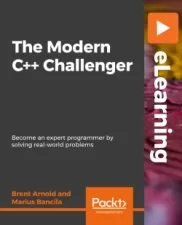C Depth 4th Video Edition
Focused View
17:16:43
76 View
001 - Part 1. C# in context.mp4
01:02
002 - An evolving language.mp4
07:41
003 - Ever more concise code.mp4
10:34
004 - Balancing efficiency and complexity.mp4
06:17
005 - An evolving platform.mp4
06:20
006 - An evolving book.mp4
07:03
007 - Part 2. C# 25.mp4
03:25
008 - Generics.mp4
09:30
009 - Generics save the day.mp4
08:09
010 - What can be generic.mp4
07:29
011 - Type constraints.mp4
04:25
012 - The default and typeof operators.mp4
09:41
013 - Nullable value types.mp4
04:50
014 - CLR and framework support - The Nullable T struct.mp4
06:39
015 - Language support Part 1.mp4
08:48
016 - Language support Part 2.mp4
08:35
017 - Simplified delegate creation.mp4
09:21
018 - Iterators.mp4
08:22
019 - The importance of being lazy.mp4
09:45
020 - Implementation sketch.mp4
09:22
021 - Minor features.mp4
07:01
022 - Namespace aliases.mp4
06:46
023 - Fixed-size buffers.mp4
05:40
024 - Automatically implemented properties.mp4
06:57
025 - Implicitly typed local variables (var).mp4
08:03
026 - Object and collection initializers.mp4
05:22
027 - Collection initializers.mp4
05:49
028 - Anonymous types.mp4
06:26
029 - The compiler-generated type.mp4
06:31
030 - Lambda expressions.mp4
05:00
031 - Capturing variables.mp4
11:17
032 - Expression trees.mp4
06:14
033 - Extension methods.mp4
09:48
034 - Query expressions.mp4
09:15
035 - The end result - LINQ.mp4
03:40
036 - Dynamic typing.mp4
03:26
037 - Introduction to dynamic typing.mp4
10:43
038 - Dynamic behavior beyond reflection.mp4
11:32
039 - A brief look behind the scenes.mp4
06:45
040 - Limitations and surprises in dynamic typing.mp4
08:23
041 - Usage suggestions.mp4
06:52
042 - Optional parameters and named arguments.mp4
06:48
043 - Impact on versioning.mp4
05:18
044 - COM interoperability improvements.mp4
09:27
045 - Generic variance.mp4
06:14
046 - Restrictions on using variance.mp4
10:44
047 - Introducing asynchronous functions.mp4
06:50
048 - First encounters of the asynchronous kind.mp4
07:27
049 - Thinking about asynchrony.mp4
05:41
050 - Synchronization contexts.mp4
05:02
051 - Async method declarations.mp4
06:48
052 - Await expressions.mp4
08:57
053 - Wrapping of return values.mp4
03:05
054 - Asynchronous method flow.mp4
11:53
055 - The use of awaitable pattern members.mp4
07:25
056 - Method completion.mp4
10:34
057 - Asynchronous anonymous functions.mp4
02:46
058 - Custom task types in C# 7.mp4
10:13
059 - Async main methods in C# 7.1.mp4
02:34
060 - Usage tips.mp4
08:20
061 - Allow cancellation wherever possible.mp4
06:23
062 - Structure of the generated code.mp4
10:15
063 - The stub method - Preparation and taking the first step.mp4
10:39
064 - The MoveNext() method (high level).mp4
05:07
065 - A simple MoveNext() implementation.mp4
10:42
066 - How control flow affects MoveNext().mp4
09:15
067 - Execution contexts and flow.mp4
07:40
068 - Capturing variables in foreach loops.mp4
04:18
069 - Caller information attributes.mp4
08:20
070 - Corner cases of caller information attributes.mp4
11:20
071 - Using caller information attributes with old versions of .NET.mp4
02:35
072 - Part 3. C# 6.mp4
01:28
073 - A brief history of properties.mp4
06:29
074 - Upgrades to automatically implemented properties.mp4
08:14
075 - Expression-bodied members.mp4
09:19
076 - Restrictions on expression-bodied members in C# 6.mp4
07:35
077 - A recap on string formatting in .NET.mp4
07:26
078 - Localization.mp4
07:29
079 - Introducing interpolated string literals.mp4
08:54
080 - Localization using FormattableString.mp4
09:41
081 - Other uses for FormattableString.mp4
08:34
082 - Uses, guidelines, and limitations.mp4
07:11
083 - Hard limitations of interpolated string literals.mp4
08:07
084 - Accessing identifiers with nameof.mp4
07:32
085 - Tricks and traps when using nameof.mp4
08:25
086 - Using static directives.mp4
11:05
087 - Object and collection initializer enhancements.mp4
08:14
088 - Using extension methods in collection initializers.mp4
11:28
089 - The null conditional operator.mp4
08:41
090 - Indexers and the null conditional operator.mp4
05:54
091 - Exception filters.mp4
08:17
092 - Retrying operations.mp4
09:39
093 - Part 4. C# 7 and beyond.mp4
04:06
094 - Introduction to tuples.mp4
04:21
095 - Tuple literals and tuple types.mp4
08:07
096 - Tuples as bags of variables.mp4
07:22
097 - Tuple types and conversions.mp4
04:07
098 - Conversions from tuple literals to tuple types.mp4
09:02
099 - Conversions between tuple types.mp4
11:04
100 - Tuples in the CLR.mp4
10:36
101 - Regular equality and ordering comparisons.mp4
11:47
102 - Alternatives to tuples.mp4
05:47
103 - Uses and recommendations.mp4
09:52
104 - Deconstruction of tuples.mp4
08:40
105 - Deconstruction assignments to existing variables and properties.mp4
08:48
106 - Deconstruction of nontuple types.mp4
07:59
107 - Introduction to pattern matching.mp4
03:49
108 - Patterns available in C# 7.0.mp4
08:35
109 - Using patterns with the is operator.mp4
04:25
110 - Using patterns with switch statements.mp4
07:46
111 - Evaluation order of pattern-based switch statements.mp4
04:21
112 - Thoughts on usage.mp4
05:58
113 - Recap - What do you know about ref.mp4
08:17
114 - Ref locals and ref returns.mp4
10:15
115 - Ref returns.mp4
10:15
116 - in parameters (C# 7.2).mp4
07:19
117 - Overloading with in parameters.mp4
06:10
118 - Declaring structs as readonly (C# 7.2).mp4
09:57
119 - Extension methods with ref or in parameters (C# 7.2).mp4
06:47
120 - Ref-like structs (C# 7.2).mp4
04:18
121 - Span T and stackalloc.mp4
12:01
122 - Local methods.mp4
09:26
123 - Local method implementations.mp4
08:52
124 - Usage guidelines.mp4
04:55
125 - Out variables.mp4
03:55
126 - Improvements to numeric literals.mp4
09:26
127 - Nontrailing named arguments (C# 7.2).mp4
04:57
128 - Minor improvements in C# 7.3.mp4
06:53
129 - Nullable reference types.mp4
08:46
130 - Nullable reference types at compile time and execution time.mp4
08:08
131 - Experiences of nullable reference type migration.mp4
07:18
132 - Future improvements.mp4
08:45
133 - Switch expressions.mp4
04:50
134 - Recursive pattern matching.mp4
05:43
135 - Indexes and ranges.mp4
05:42
136 - More async integration.mp4
10:07
137 - Features not yet in preview.mp4
08:47
138 - Even more features in brief.mp4
07:12
More details
User Reviews
Rating
average 0
Focused display
Category

O'Reilly
View courses O'ReillyO'Reilly Media is an American learning company established by Tim O'Reilly that publishes books, produces tech conferences, and provides an online learning platform. Its distinctive brand features a woodcut of an animal on many of its book covers.
- language english
- Training sessions 138
- duration 17:16:43
- Release Date 2023/11/06










